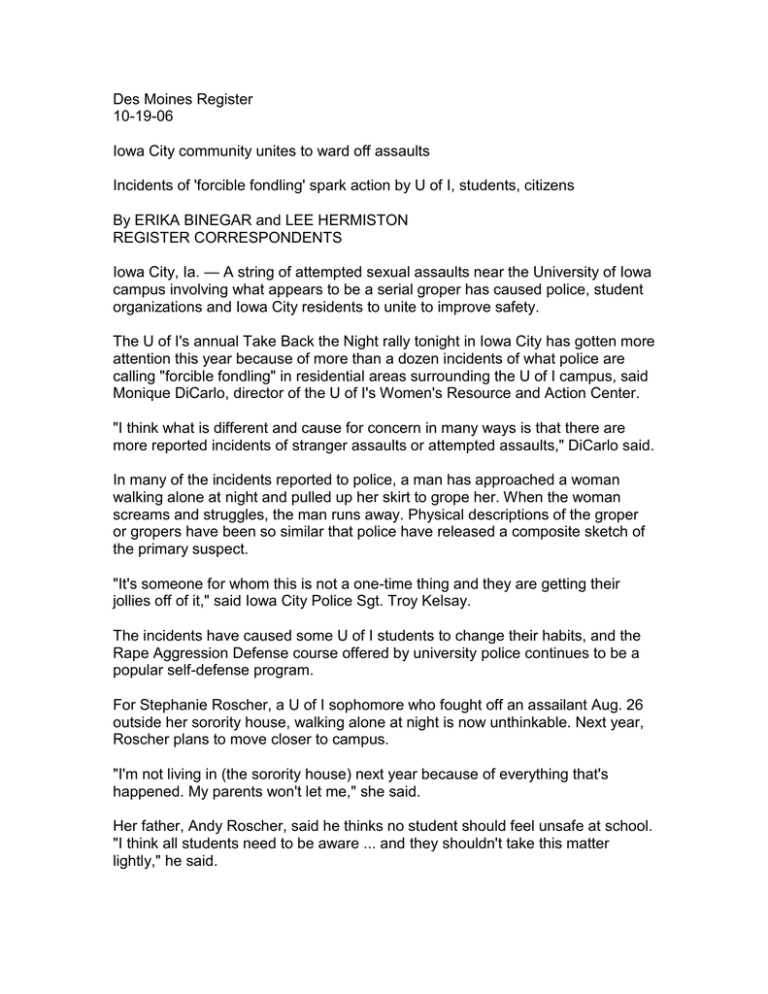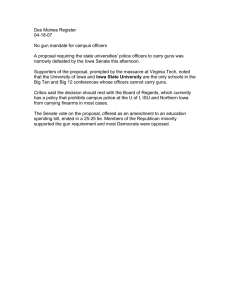
Des Moines Register
10-19-06
Iowa City community unites to ward off assaults
Incidents of 'forcible fondling' spark action by U of I, students, citizens
By ERIKA BINEGAR and LEE HERMISTON
REGISTER CORRESPONDENTS
Iowa City, Ia. — A string of attempted sexual assaults near the University of Iowa
campus involving what appears to be a serial groper has caused police, student
organizations and Iowa City residents to unite to improve safety.
The U of I's annual Take Back the Night rally tonight in Iowa City has gotten more
attention this year because of more than a dozen incidents of what police are
calling "forcible fondling" in residential areas surrounding the U of I campus, said
Monique DiCarlo, director of the U of I's Women's Resource and Action Center.
"I think what is different and cause for concern in many ways is that there are
more reported incidents of stranger assaults or attempted assaults," DiCarlo said.
In many of the incidents reported to police, a man has approached a woman
walking alone at night and pulled up her skirt to grope her. When the woman
screams and struggles, the man runs away. Physical descriptions of the groper
or gropers have been so similar that police have released a composite sketch of
the primary suspect.
"It's someone for whom this is not a one-time thing and they are getting their
jollies off of it," said Iowa City Police Sgt. Troy Kelsay.
The incidents have caused some U of I students to change their habits, and the
Rape Aggression Defense course offered by university police continues to be a
popular self-defense program.
For Stephanie Roscher, a U of I sophomore who fought off an assailant Aug. 26
outside her sorority house, walking alone at night is now unthinkable. Next year,
Roscher plans to move closer to campus.
"I'm not living in (the sorority house) next year because of everything that's
happened. My parents won't let me," she said.
Her father, Andy Roscher, said he thinks no student should feel unsafe at school.
"I think all students need to be aware ... and they shouldn't take this matter
lightly," he said.
Iowa City and the U of I together had a higher rate of forcible rape reports, which
are more serious than forcible fondlings, than Iowa's other public-university
towns, according to the FBI's 2005 Uniform Crime Report. The report does not
track forcible fondling, which likely would be charged as assault with intent to
commit sex abuse or simple assault.
Iowa City and the U of I together had 37 rape reports per 100,000 residents,
compared with 22.8 reported rapes per 100,000 residents of Ames and Iowa
State University combined. Cedar Falls and the University of Northern Iowa
together had 26.3 rape reports per 100,000 residents in 2005, the report states.
Iowa City and the U of I together had a higher rape rate than several other Big 10
university towns, including Madison, Wis./University of Wisconsin and Ann Arbor,
Mich./University of Michigan.
However, a campus's crime rate is not the only way to measure safety, said
Alison Kiss, program director of Security on Campus, a Pennsylvania-based
safety and security group.
"If a campus has a high crime rate, that's not necessarily a bad thing,'' she said.
"It's how the campus responds to the crime. A lot of times, we'll see schools with
50,000 students, and they're reporting no crime across the board, and that raises
questions."
Iowa City and U of I police sent out e-mail messages last week to students,
faculty, staff and news outlets about plans to band together to find the man or
men perpetrating the assaults. They have increased patrols in the area, compiled
a list of safety tips, and re-released a composite sketch of the serial groper.
Since July 1, the Iowa City Police Department has received 12 reports of
assaults or attempted sexual assaults. Since Jan. 1, there have been 90
aggravated assaults, 30 forcible fondlings and 392 simple assaults reported. On
campus, there have been two reports of attempted assaults since May.
No new sexual assault reports have been filed since Oct. 7, Iowa City Police Sgt.
Doug Hart said.
"We're hoping the mere presence may deter assaults or future assaults, or we
may come across people acting suspiciously in those areas," Hart said.
Student leaders are lobbying the university to add a bus route to the residential
area east of campus.
How to stay safe at night
1. Look and act confident while you are walking. Be aware of your surroundings,
trust your instincts and don't be concerned about appearing rude if you feel
threatened.
2. There is safety in numbers; make it a habit to walk with others.
3. If you regularly jog or bicycle, vary your route and time. Stay on well-lit roads
and main paths with open spaces where you can see and be seen by other
people. Avoid wooded areas and adjust your routine to daylight hours, if possible.
4. Recognize that the use of a cell phone or personal stereo may distract you
from paying attention to your surroundings and people acting suspiciously.
5. Avoid consuming alcohol or other substances that may impair your judgment
or your ability to react to a confrontation.
6. Let someone know when you intend to leave and arrive at a particular
destination.
7. If you think someone is following you, go to the nearest place where there are
other people and/or a place that is well lit. In an emergency, use your cell phone
to call 911.
Source: Iowa City Police Department and the University of Iowa Department of
Public Safety


